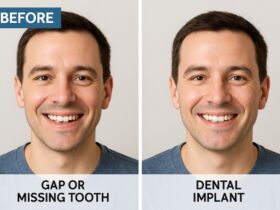The quest for the perfect smile has led to significant strides in dental technology, with dental implants being at the forefront of this innovation. Once a niche procedure, they are now a cornerstone treatment in restorative dentistry. Dental implants offer a permanent solution for those who have lost one or more teeth, delivering both functional integrity and aesthetic value to a patient’s smile. Herein lies an exploration of how these advances are revolutionizing the field of oral health.
The Advent of Dental Implants
Emerging initially as a complex surgical procedure, dental implants have since developed into a more accessible and routine form of treatment. The success of this technique is underpinned by osseointegration, the process by which the implant, typically made of biocompatible titanium, fuses with the jawbone, thereby establishing a solid foundation for the artificial tooth.
The Advantages of Implant Dentistry
Implant-based restorations offer significant advantages over traditional dentures or bridges. Their stability and permanence ensure that patients can enjoy a broad range of foods without concern for slippage, which is a common complaint among denture wearers. Furthermore, implants maintain jawbone density, preventing the facial changes that often follow tooth loss.
The Procedure of Implants Placement
The placement of dental implants is a multi-step process. It begins with a comprehensive assessment where digital imaging is often utilized to plan the intervention. The dental surgeon then inserts the implant into the jawbone, after which a period of healing is required to allow for osseointegration. Once the implant is fully integrated, an abutment and crown are added to complete the restoration.
The Role of Precision in Implantology
A critical factor in the success of dental implants is the precision of placement. Advanced imaging and computer-aided design/manufacturing (CAD/CAM) technology ensure that the implant is positioned accurately within the jaw, allowing for optimal function and appearance.
Material Innovations in Implant Dentistry
Technological advancements have also ushered in the use of new materials that enhance the performance and aesthetic of dental implants. Innovations in ceramic technology, for instance, have allowed for the development of tooth-colored implants that offer a more natural look compared to traditional metallic alternatives.
The Impact on Oral Health Maintenance
Dental implants have a profound impact on the maintenance of good oral health. By replacing missing teeth, they restore the mouth’s function and prevent the remaining teeth from shifting, which could otherwise lead to further dental complications.
Quality of Life and Dental Implants
The repercussions of tooth loss extend beyond oral health, impacting an individual’s quality of life, including their confidence and psychological well-being. Dental implants offer a solution that is as close as possible to natural teeth, importantly enhancing the patient’s self-esteem and social engagement.
Implants Over Other Dental Procedures
When compared to other dental procedures for tooth restoration, implants stand out for their durability and success rate. Unlike bridges, which require alteration to neighbouring teeth, implants are a standalone solution that preserves the integrity of the rest of the dentition.
The Surge in Demand for Implant Treatments
The growing awareness of the long-term benefits of dental implants has led to a surge in demand. Rising life expectancy and value placed on dental aesthetics are drivers of this trend.
Dental Implants and Overall Health
Dental health is intrinsically linked to overall health. By resolving issues such as misalignment and malocclusion that result from tooth loss, dental implants contribute to improved nutrition, digestion, and even speech.
The Future of Dental Implants
As the dental implant domain continues to evolve, future developments in material science and digital dentistry are expected to provide even further improvements to this already cutting-edge procedure. There is also mounting evidence to support the systemic benefits of dental implants, indicating potential growth of implants as a recommended option for a wider range of patients.
Patient Eligibility for Dental Implants
While dental implants are generally safe and highly successful, they are not suitable for everyone. Patients must undergo a thorough health evaluation to ensure adequate bone density and overall health that supports the healing process post-surgery.
The Importance of Choosing the Right Dental Specialist
Implantology requires a dental specialist with advanced training and experience. It is crucial for patients to select the right dental professional to guarantee the best possible outcomes. Clinics that prioritize ongoing education and employ the latest techniques in implantology are often the best choice for those seeking dental implants.
Understanding the Investment in Dental Implants
Cost considerations are important for patients exploring the option of dental implants. While they represent a significant upfront investment compared to other forms of dental prostheses, their longevity and health benefits make them a cost-effective solution in the long run.
Conclusion
Dental implants are an investment in health, functionality, and aesthetics, amply justifying their role as a revolutionary tool in smile restoration. As this domain of dentistry continues to advance, it holds the promise of even higher success rates and the potential to positively transform the lives of individuals around the world.





